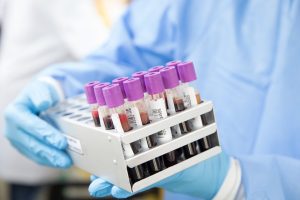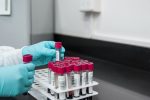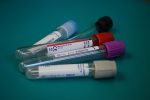
It should not be expected that a phlebotomy student could have gained enough practical skills on a 4-month training program.
That is why on-the-job phlebotomy training is crucial.
Their academic knowledge gained at a local college has to be built on with performing the exact duties.
We decided to create this short guide on what you can expect from job-based training and to mention all the reasons why it is so important.
During a typical phlebotomy training program, you learn the basics of phlebotomy.
However, you will not be working directly with real patients.
So as to experience what it is like when being part of a medical facility each day, your training should consist of working directly with a supervisor.
This is necessary as you will learn how to react when different scenarios are encountered each day.
You will not be allowed to work unsupervised for months, but once you finish this part of the training, you will be ready to start working on your own, and this is essential for both you and your employer.
Page Navigation
What is on the Job Phlebotomy Training?
People who have already completed a phlebotomy training course sometimes wonder why extra training in-house is needed.
We have to say that there is a number of different reasons hospitals and clinics offer hands-on training.
We will focus on those reasons and will cover what you can expect with on-the-job training.
Those individuals who got certified as phlebotomists should also have on-the-job training.
Certification will help them get hired easily compared to someone who does not have a certification, but a certificate does not mean that a person has all the training and skills necessary to work with patients.
Things that you can learn during on-the-job training cannot be taught in a classroom setting.
Why Do Medical Facilities Offer In-House Phlebotomy Training?
The first reason why hospitals offer on-the-job training is that they want to hire a phlebotomist who is both experienced and confident.
After completing your phlebotomy training, you should be able to perform venipuncture, as you had to do it on a large number of volunteers or other students during the training.
But, this is not the same as working in a hospital or busy clinic.
Once you get hired, you will be a phlebotomy trainee and not all facilities will allow you to work on your own.
After you have at least two years of experience, you will be allowed to work independently.
Even though phlebotomy is an entry-level position, medical facilities are aware of the fact that this is an important field and what the risks are.
So as to be able to perform successful sticks, it is beneficial to watch others do it at first and then do it under supervision until you reach enough experience.
What Are the Risks of Phlebotomy?
There are certain dangers that hospitals and clinics want to avoid so these are the reasons for required extra training:
- Accidentally sticking your patient with a needle: Being that drawing blood requires taking a stick with a needle, you need to be familiar with a method and system for doing this properly. Sticking a patient the wrong way causes pain or bleeding. Any kind of accident that might happen with a patient can be taken as a disaster for the medical facility, as a patient is able to sue you or your employer. A phlebotomist should have indemnity insurance for these kinds of situations, but all hospitals want to avoid these things to happen.
- Accidentally sticking yourself with a needle: Phlebotomists who lack experience can sometimes hurt themselves. If you are not as confident as you should be, it is easier to make a mistake. The more experience you have more easily you will stay completely focused. One of the most significant risks is sticking yourself with a needle. If the needle was used, you could instantly be at risk for blood-borne illnesses.
- Giving the medical facility a bad reputation: A hospital provides extra training to phlebotomy graduates to make sure they will not give the facility a bad reputation. Each medical facility has slightly different rules, and novice phlebotomists have to get familiar with their own way of communicating with patients and providing service. During the on-the-job training, you will learn how the exact place of employment works and functions.
What Can I Learn from In-House Training?
Some people might think that once they finish a phlebotomy training program, they will know everything about phlebotomy.
This is not true, and in order to improve your knowledge, medical facilities offer on-the-job training.
Those who receive more education on the job will grow their career and these are some of the essential things you can learn throughout this training.
Personal Skills
A training program can teach what you need to know related to how to perform venipunctures, but your employer might expect more from you, and personal requirements cannot be taught at school.
We need to emphasize that nobody has the perfect characteristics to be a phlebotomist, but you can make yourself an appropriate candidate if you get better at the required skills and qualities and provide strong patient service.
These are just some of the most important characteristics that a professional phlebotomist should have:
- Organizational skills
- Kindness
- Patience
- Responsible
- Tolerant
You might not have all these skills, but you can always take the extra training opportunity to make yourself even better.
And learning these skills on the job makes you able to determine exactly how you should behave and carry yourself around patients.
In-House Safety Procedures
The potential risks of this profession are numerous, so many employers train their employees on their specific safety procedures.
Every facility has its own set of rules, which are more important than anywhere else.
If a phlebotomist follows these rules and regulations, he/she will keep both himself/herself and the patients safe.
Phlebotomists have to travel to different areas and in busy hospitals from floor to floor.
Your job will include taking samples to a lab, so you must know how to do this correctly.
A phlebotomist has to be familiar with lab safety precautions.
Yes, we know that each phlebotomy training covers the basics of safety procedures, but it does not teach you how to put them in place for your place of employment.
Different Venipuncture Techniques
A phlebotomy education program teaches students the basics of drawing blood.
You cannot graduate unless you know how to perform successful blood draws.
However, we need to say that there is always more to learn.
There are different venipuncture techniques, which are not available with all the programs.
You may find yourself in a situation when your patient does not have a viable vein.
You cannot spend hours looking for a vein but must be prepared to draw blood elsewhere.
If you have on-the-job training in a medical facility, you will definitely have to face these situations and you will be better prepared for your own blood drawing.
Furthermore, in the facility, you can learn about different types of syringes and how to use them, different blood draw techniques, and various locations where you can draw from.
The most important aspect of on-the-job training is that it will train you to stay calm under pressure.
Those who lack experience will feel upset and anxious if they cannot find a vein on an obese person.
The worse feeling comes if a patient is getting frustrated.
The on the job training will make you more prepared to handle these situations.
Working as part of a Team
During the phlebotomy training through a college or specific program, you will be focused on your education and you will not need to cooperate with other people who will work with you.
In whatever facility or organization you find employment in, you will need to work with others.
The on the job training provides you with tips on how to interact with others to achieve a common goal.
A phlebotomy technician at a hospital is a team member.
You are the one who draws blood from patients, but you are required to interact with the lab.
Then, the lab works together to develop a diagnosis and they are in charge of giving the diagnosis to a physician.
So, the whole procedure starts with you, as a phlebotomist.
But you are a part of a larger team in the medical facility.
As you will have to interact with both patients and staff members on a daily basis, our suggestion is to build strong working relationships, thus making your job a lot easier.
Hands-On Equipment Experience
Upon finishing a standard phlebotomy program you get familiar with the tools and equipment you will be using once you start working, but some facilities might have different tools or pieces of equipment that you might not have a chance to get familiar with.
So, getting training at a medical facility gives you a chance to use them, if you did not cover all of them in your training program.
These tools and equipment are related to different venipuncture techniques and you must know how to use them so as to feel comfortable when you start working with them.
In case you learned about specific tools and pieces of equipment but never used them during your program, you will get a chance to reach hands-on experience.
In your work environment, a supervisor will explain to you how to use them, and you can observe him/her while working with them.
You will be given a chance to do the work under supervision, as well.
Once your employer is confident that you can work on your own, he/she will give you an opportunity to work independently.
Learning the Physical Skills
This is another thing that students cannot learn in a classroom.
We find it necessary to mention that physical stamina is necessary to be a phlebotomist.
It should not be taken as a small thing, as it definitely has a huge impact on this job.
Getting hired as a trainee is somehow considered a trial period, as not only will you learn from your employer, but they will also learn a lot about you.
Besides all the personality traits that are needed to be a good phlebotomist, certain physical skills are also required.
A great phlebotomist must have strong hand-eye coordination.
Being skilled in this area is obligatory as you will be working with needles and veins.
If you have enough practice with venipuncture, you will assess your coordination and get better at it over time.
You need to have strong feet as well, being that phlebotomists spend most of the day standing or walking.
Those who work in a large facility will need to walk a lot, as well as move quickly between patients and transporting blood samples.
So, people who are not physically ready may not be a good fit for a big or busy hospital but should look for employment in slow-paced facilities and organizations.
During your on-the-job training, your employer will get a better idea of that, especially if you are not up to the physical demands.
Taking Extra Training Courses
Do not get confused if you are asked to take extra training courses.
So as to be able to work on your own, some facilities may ask you to finish some of the most common courses, such as CPR.
Becoming CPR certified is important no matter whether you work in a hospital or small private practice.
CPR is not something that you can learn on the job, so taking it as an extra course may be a requirement so as to get hired.
There are hospitals that may ask that you take other courses, depending on what other duties might be expected of you.
Our suggestion is to get familiar with those expectations during the interview process so as to know how to prepare before you get hired.
How to Gain Experience After Training
Besides the fact that phlebotomists are in high demand, it does not mean that each facility will hire individuals right after they come out of the training program.
This career field shows no signs of slowing down, being that the population keeps getting older and technology continues to advance.
After finishing your phlebotomy training, you will no be allowed to work on your own as a phlebotomist without experience.
On-the-job training enables you to get this experience.
Also, there are other chances for building up your resume.
Two of the most practical options include:
- Internships: Some medical facilities might not hire you as an employee, but will offer you an internship. Internships are ideal opportunities to get on-the-job training, but you will not get paid. of course, you will not have all the responsibilities that a hired phlebotomist has, but you will work with professionals and gain experience in a specific setting. The chances that you get hired by a hospital where you attended an internship are better.
- Volunteering: Upon finishing the phlebotomy program you would like to start working, but so as to get employed, you will need to have some experience, and volunteer work as a phlebotomist is one of the best ways to get it. So as to boost your resume, you can start volunteering in many organizations that cannot afford to have full-time phlebotomists on staff. This means that they depend on phlebotomy volunteers and you can take advantage and achieve hands-on experience there.
We wanted to mention the places that are always in need of phlebotomy volunteers and they include:
- The American Red Cross
- Local blood drives/blood banks
- Veterans’ hospitals
- Nursing homes
Can a Phlebotomist Advance Their Career Through on-the-Job Training?
If you thought that several months of training and possible certification would be enough to get a well-paid job, we need to disappoint you.
It is true that your career as a phlebotomist will start, but you cannot expect to get hired right away.
Several more months, and up to two years you will need to work as a trainee before you will be allowed to work on your own.
Now, you might be wondering whether all this training is worth an entry-level career.
We need to say: yes.
Not only is phlebotomy is a fast-growing career, but it is such a rewarding and quite a lucrative profession.
Those who wish can take more schooling and go towards reaching different positions in medicine.
Numerous nurses and doctors started out as phlebotomists and then continued their education.
The more experience you reach and the more time you spend working as a phlebotomist, the greater are the chances that you will be promoted.
You can get a supervisory position, meaning that you will be the one who watches over new phlebotomy trainees.
Those who reach these advancements can expect even more benefits.
While the average salary for an entry-level phlebotomist is about $33,000, those who have supervisory positions make nearly $40,000 per year.
We need to state that on-the-job training means you will still be getting paid for what you do.
Learning from Phlebotomy on the Job Training
Even those who are already working in the medical field but consider moving into phlebotomy should get the training, being that it offers many benefits.
They will need to take a formal training course, but they will not have in-house training afterward.
Those who have no experience can also find work as a phlebotomist, but they must be willing to get hired as a trainee.
How long you will need to be a trainee, depends on the facility you find employment in, as each of them has its own guidelines.
Training in-house can be really beneficial and if you make the most of it, you will definitely be doing your job much better once you start drawing blood independently.
Above all, you will be helping patients every day.








